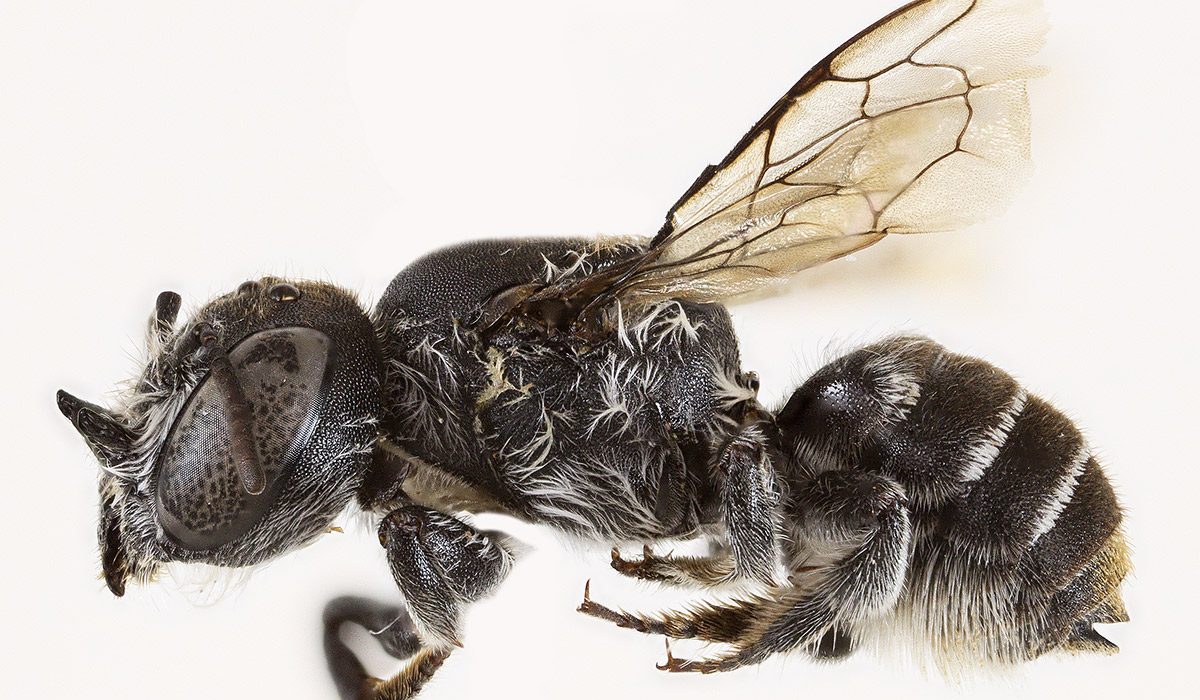Science
Scientists Unveil New ‘Lucifer’ Horned Bee in Australia

A new species of bee, named Megachile (Hackeriapis) lucifer, has been identified in Western Australia, captivating scientists with its distinct horn-like features. This discovery was announced by researchers at Curtin University, where the bee has been affectionately named “Lucifer,” inspired by a popular Netflix series.
The bee was first discovered by Dr. Kit Prendergast during a survey of a critically endangered wildflower in 2019. Dr. Prendergast, affiliated with the university’s School of Molecular and Life Sciences, noted the striking appearance of the female bee, which possesses remarkable horns on its face. She remarked, “The female had these incredible little horns on her face,” pointing to the insect’s unique characteristics.
The name “Lucifer” holds dual significance. In Latin, it translates to “light-bringer,” but it also serves as a playful reference to the show of the same name. Dr. Prendergast, a fan of the series, expressed her enthusiasm for the name, stating it perfectly suits the bee’s intriguing look.
Through the process of DNA barcoding, researchers confirmed that both male and female specimens belonged to the same species. Dr. Prendergast emphasized that neither the genetic data nor the morphological traits matched any previously known bees in existing databases or museum collections. This identification marks the first new member of this bee group in over 20 years, highlighting the ongoing potential for discovering new life forms.
Significance of the Discovery
Dr. Prendergast hopes this discovery will raise awareness about the myriad of undiscovered species, particularly in habitats vulnerable to mining activities. She pointed out, “Many mining companies still don’t survey for native bees, so we may be missing undescribed species, including those that play crucial roles in supporting threatened plants and ecosystems.”
With almost all flowering plants relying on wild pollinators, particularly bees, the ongoing threats of habitat loss and climate change are pushing many vital species towards extinction. Dr. Prendergast warned, “Without knowing which native bees exist and what plants they depend on, we risk losing both before we even realize they’re there.”
This discovery of the Lucifer bee not only enhances biodiversity knowledge but also underscores the urgent need for conservation efforts to protect these essential pollinators. As scientists continue to explore the rich ecosystems of Australia, the potential for finding more undiscovered species remains a compelling call to action for environmental stewardship.
-

 Top Stories3 months ago
Top Stories3 months agoTributes Surge for 9-Year-Old Leon Briody After Cancer Battle
-

 Entertainment4 months ago
Entertainment4 months agoAimee Osbourne Joins Family for Emotional Tribute to Ozzy
-

 Politics4 months ago
Politics4 months agoDanny Healy-Rae Considers Complaint After Altercation with Garda
-

 Top Stories4 months ago
Top Stories4 months agoIreland Enjoys Summer Heat as Hurricane Erin Approaches Atlantic
-

 World5 months ago
World5 months agoHawaii Commemorates 80 Years Since Hiroshima Bombing with Ceremony
-

 Top Stories3 months ago
Top Stories3 months agoNewcastle West Woman Patricia Foley Found Safe After Urgent Search
-

 Top Stories5 months ago
Top Stories5 months agoFianna Fáil TDs Urgently Consider Maire Geoghegan-Quinn for Presidency
-

 World5 months ago
World5 months agoCouple Convicted of Murdering Two-Year-Old Grandson in Wales
-

 World5 months ago
World5 months agoGaza Aid Distribution Tragedy: 20 Killed Amid Ongoing Violence
-

 World5 months ago
World5 months agoAristocrat Constance Marten and Partner Convicted of Infant Murder
-

 Top Stories4 months ago
Top Stories4 months agoClimbing Errigal: A Must-Do Summer Adventure in Donegal
-

 Top Stories4 months ago
Top Stories4 months agoHike Donegal’s Errigal Mountain NOW for Unforgettable Summer Views









